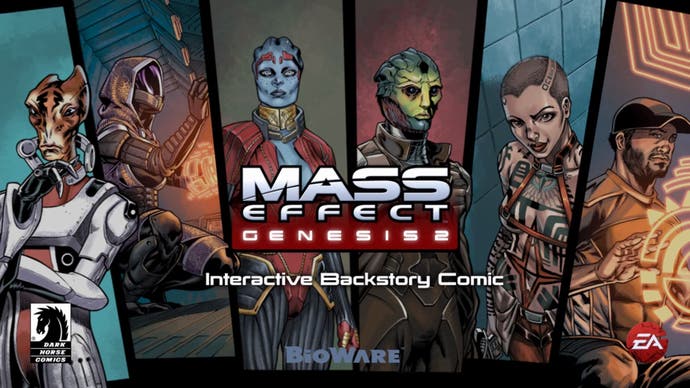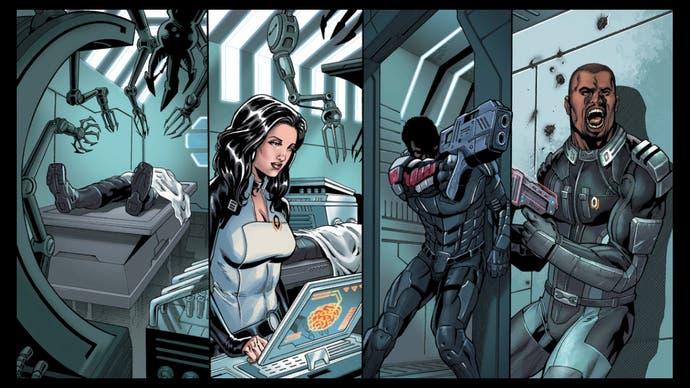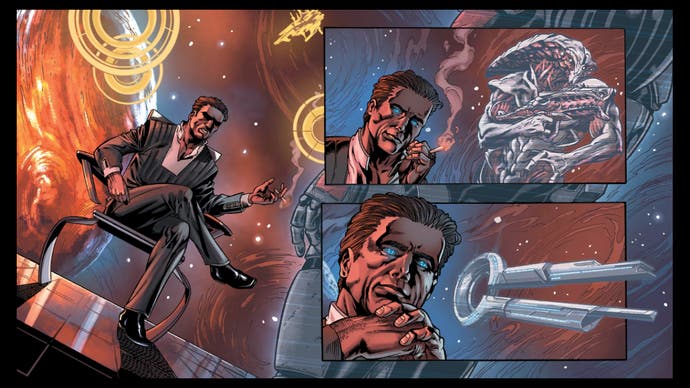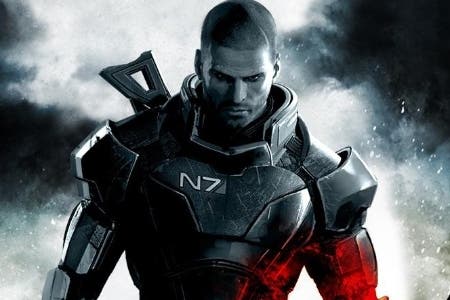Face-Off: Mass Effect 3 Special Edition on Wii U
Nintendo's new console vs. Xbox 360 and PlayStation 3.
Over the last six years, developers have sought to find balance in their cross-platform development, weighing up the pluses and minuses of the PS3 and Xbox 360 and looking to strike a good balance between the two. Microsoft concentrates on a stronger graphics core while Sony has put its efforts into an advanced CPU, but on a general level most games these days work out pretty well overall on both machines. With Wii U, the balance in processing power shifts again: Nintendo has beefed up the graphics core beyond current-gen standards, but all the evidence points to a weaker CPU.
Bearing in mind the decisions the platform holder has made with the design of the Wii U, can the hardware handle Unreal Engine 3 - a middleware designed with the older HD console trade-offs very much in mind? There've been a number of alarming screenshots and video of the Wii U version of UE3 Batman: Arkham City, showing clear and obvious graphical drawbacks on the new Nintendo system - most notably low resolution shadowmaps. Numerous theories are circulating on why this may be an issue but the most plausible explanation involves the way Wii U memory is set-up. There's an enviable 1GB of RAM available for games applications (up from the 512MB found in the Xbox 360 and PlayStation 3), but it's significantly slower than the throughput of the GDDR3 found in the Microsoft console.
To mitigate the issue, the Wii U has 32MB of ultra-fast onboard eDRAM integrated into the AMD graphics core and the new hardware almost certainly renders out directly from that. We're not yet clear on how texture fetching works on the new console but conceivably the challenge becomes a matter of importing assets from the main RAM into the GPU eDRAM in an orderly fashion and keeping them contained in that space before exporting the whole framebuffer to the video output. Shadowmaps take up a lot of space which may explain why they have apparently been downscaled on Arkham City. This ties in with why we've yet to see any Wii U title with multi-sampling anti-aliasing - each pass would take up valuable eDRAM [Update: We spoke too soon here as Black Ops 2 appears to feature it]. So where does all of this leave Mass Effect 3 - one of the most visually complex of Unreal Engine 3 titles?
Let's answer that immediately by comparing Mass Effect 3 on Wii U with the Xbox 360 and PlayStation 3 versions of the game in a brace of video head-to-heads, backed by a triple-format gallery.
"Aside from colour temperature differences, the game is a match on all three console platforms with 720p resolution and FXAA anti-aliasing producing similar results."
Alternative analysis: Mass Effect 3 - PlayStation 3 vs. Wii U
Thankfully, we find that developer Straight Right's work with the Wii U is generally rather good. Across a range of comparisons we can't find much at fault at all with the image quality. It appears that all of the visual assets from the existing console versions have made it across intact, though the additional bling found in the PC version remains exclusive to that platform. The only variance we see comes in the gamma levels. We've extrapolated out full range RGB from the Wii U's limited range output by remapping RGB 16-235 to 0-255 with a standard levels filter (not an ideal situation but the best we can do to present some level of parity), but it's interesting that the look of the game in terms of colour temperatures is still quite different to the other console versions.
Mass Effect 3 on Wii U - performance comparisons
So, with the image quality concerns resolved we move onto the thorny issue of performance. Some reviews have expressed some reservations about the Wii U version of the game, suggesting that it suffers from off-putting frame-rate drops. We'd suggest that this needs to be put into context: anyone who has played the existing console versions of any of the Mass Effect titles will know that this is an issue regardless of hardware, though Xbox 360 has historically commanded an advantage over PlayStation 3 - especially so with Mass Effect 3.
Thankfully, our existing tools handle the Wii U's video output without the need for any modifications so the process of analysing performance on the new hardware is remarkably straightforward. First up, let's take a look at frame-rates during like-for-like scenes across a range of samples from the game. To give a good sample we've covered off both in-game traversal and cut-scenes.
The results are unambiguous. We see a small Wii U advantage over the Xbox 360 in one scene but elsewhere it appears to sit comfortably between the Microsoft platform and the under-performing PlayStation 3 version. In only one area do we see PS3 pull ahead of the Wii U: walking through the hospital in the Citadel, we see frame-rates drop to an alarmingly low level on the new Nintendo console. The beefed up amounts of non-player characters appear to be the culprit here and this does lend some weight to the notion that lack of CPU power in the Wii U does pose some serious challenges for developers.
"Wii U has some problem areas where both Xbox 360 and PS3 pull ahead, but generally speaking, the new game has much in common with the same game running on the Microsoft platform."
The next test is more of a thorough workout and is designed to be indicative of in-game performance. We take a number of gameplay clips where the engine is being put through its paces and process them through our tools. Excerpts are chosen from a number of environments - both indoors and outdoors - and we compare intense blasting across all three platforms simultaneously. The variance in gameplay is represented with a triple split-screen view so you can get some idea of what instigates the various performance snafus on each console, but the negative impact of this is that the amount of screen real-estate we can display drops significantly so it's a bit more difficult to see what's going on more generally.
Regardless, the video tells a fairly straightforward story - performance remains an obvious concern on the PlayStation 3, while the Wii U and Xbox 360 ran at virtual parity for much of the run of the play. Screen-filling effects work causes noticeable frame-rate dips on the Microsoft platform, but Wii U appears to be relatively consistent - even on the more open, challenging battlescapes of Palaven. However, the final clip demonstrates that you can't rely on a sustained performance throughout the game. Here, for reasons which elude us, Wii U suffers badly in a relatively simple exchange of fire. It's indicative of a number of areas throughout the game where the new platform matches or even drops below the performance level of the PlayStation 3 release. Thankfully though, such areas seem relatively sparse in the time we've put into the game thus far.
The overall conclusion is clear enough though: Xbox 360 takes the honours in terms of in-game frame-rates, Wii U is the runner-up while the PlayStation 3 version of the game generally lags behind both of them.
"The overall conclusion is clear enough: Xbox 360 takes the honours in terms of in-game frame-rates, Wii U is the runner-up while the PlayStation 3 version of the game generally lags behind both of them. "
Wii U Exclusive Features
Mass Effect 3 on Wii U is compatible with the 360-esque Pro Controller, and with that accessory attached the gameplay experience is essentially a match for the existing console versions. However, there is enhanced gamepad functionality too: during exploration and combat sections, 2D maps of the area are rendered onto the touch-screen, which also displays the location of your next goal. It's a double-edged sword: on the one hand, it's a genuinely useful tool if the route forward isn't immediately obvious but on the flipside, it becomes all too easy to "cheat" by looking at the display and you may well miss a number of useful pick-ups you would have found through more natural exploration.
The touch-screen has unique properties in other areas though. For a start, powers can be mapped to icons, allowing instant access to those abilities without recourse to the radial selection dials. Again, this has its disadvantages - the traditional method of selecting powers stops the game dead, with the action resuming as soon as you have made your selection. With the tablet method, gameplay continues as per normal and your focus is inevitably drawn away from the main screen, which can leave you vulnerable. A genuinely useful addition is enhanced squad control - CPU AI has never been state-of-the-art and the ability to tap on a team member and plot their course through the map is a useful innovation.
"Some thought has gone into the tablet features exclusive to Wii U, with the map display the ability to plot courses for squad members being a nice little addition."




Similar to Mass Effect 2 on PlayStation 3, there's also an abridged comic rendition of the major plotlines of the previous games, offering players the opportunity to choose some of the most important decisions and have the ramifications of that play out in the main game. Unfortunately, it's a bit of a naff effort, with the second game's choices in particular being very poorly represented. DLC isn't factored into the story either, impacting on the crew choice available. Overall it's better than nothing but comes across as a bit of an afterthought.
There's also mixed news in the DLC department. By default several of the existing DLC packs are included as standard - specifically, the Extended Ending, From Ashes and the Resurgence, Rebellion and Earth multiplayer expansions. At the time of writing, the Leviathan and Omega DLC packs are not slated to appear on Wii U, which is a real shame.
Mass Effect 3 on Wii U: the Digital Foundry verdict
Aside from some cute but non-essential gamepad features, it's safe to say that Mass Effect 3 on Wii U is a solid enough conversion but offers nothing of substance to elevate it over the existing Xbox 360 and PC versions of the game - it's clearly an improvement over the lacklustre PlayStation 3 release with a higher performance level, but across the overall run of play it's somewhat disappointing to see a vintage 2005 console with slower GPU and less RAM match and indeed exceed the quality of the experience found on the brand new Nintendo hardware.
Regardless of the fact that the game has been farmed out to another developer, and irrespective of the state of the current Wii U toolchain and the overall lack of experience the studio would have had with the console, the fact is that a true generational leap in power - even the 2x to 4x jump represented by the Digital Foundry PC - would be reflected in a much higher level of performance than we see here. That said, we must remember that this is a first gen Wii U title, a conversion of a game that was never designed with the platform in mind. Assuming publishers put the resources in, there's no reason to believe that we shouldn't see superior results into these multi-platform titles in the future.
In the here and now, none of this detracts from the fact that Mass Effect 3 was - and is - an exceptional video game. The Wii U version isn't the best edition of the game available and in truth it's not even the preferred console buy. Indeed, once the DLC situation is factored into the equation, there's a sense that it's being treated almost like the poor relation. But if Wii U is your only console the reality is that this is still a decent rendition of Mass Effect 3 - and through default it is one of the best games you can buy for your new machine.









